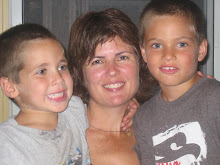Tuesday, October 23, 2007
Getting In Step With Your Step Children
Getting in Step with Your Step Family
By Kathryn Kvols
Step parenting is no easy task. Often parents are plagued with feelings of guilt for divorcing and resentment or bitterness toward their ex-spouse. They may even feel rejected and lose their confidence for a time. Parenting is difficult in the midst of so much turmoil. And when a parent acts out of these negativefeelings, parenting becomes ineffective.
I know it may be hard to imagine, but stepparenting can create more meaning and a richer life. The children will have more parents and grandparents. . . and more holiday celebrations. You will have more support in the laborious task of parenting a child. . . and moretime for rejuvenation while your child visits your former spouse.
Developing a civil relationship with your former spouse andpeacefully blending a new family won't happen over night.However, here is a list of do's and don'ts that will point you in the right direction.
Don'ts:
- Don't try to find out information about your former spousethrough your children.
- Don't make your former spouse wrong or put her/him down in frontof your children. (Your children love you both.)
- Don't try to punish your former spouse through your children.
- Don't compare yourself to your former spouse.
- Don't compete or try to keep up with the absent, natural parent.
- Don't make excuses for a parent who is late or doesn't keepagreements. Instead, coach your child how to handle thesesituations with their parent.
- Don't try to compete with the "other" parents.
- Don't expect or demand that your stepchildren like you. It maytake years for you to establish a relationship with them. Tryingtoo hard to make them like you will only make matters worse.- Don't try to buy your stepchildren's affection and love throughpurchasing material things or by taking them on extravagant trips.
Do's:
- Learn to let go of past hurt, resentment, shame, blame, andguilt. Make amends where needed. If you are having trouble doingthis, get help from a counselor. Releasing hurt and blame could bethe most important thing you ever do to help yourself and yourfamily.
- Be supportive of your children's visitation unless you have avalid reason to believe your former spouse may harm your children.Don't make it an ordeal for him or her to be able to see theirchildren.
- Recognize that most stepchildren are jealous of the time that youspend with their parent. Allow your spouse and your stepchild tohave time alone without you. Release jealousy of this relationshipand find supportive people to lean on when you're having difficulty.
- Let the children's natural parent do most of the discipliningwith your stepchild until you have established a good relationshipwith your stepchild. Be supportive of your spouse. However, it isvery important that you do some things alone with your stepchild inorder to establish a trusting bond.
- Develop a strong parenting team. Discuss what values you want inyour family. Openly discuss discipline and come to agreement on howyou will discipline. (Taking a parenting class together ishelpful.) Once your children feel the unity between the two of you,they will test you less and there will be less stress in yourfamily. If the children continue to test, which they may, stoptrying to change them and learn to accept them unconditionally.
- Allow your child to openly discuss their feelings. Make it safefor them by listening without the intrusion of guilt ordefensiveness. Accept their feelings at face value without tryingto fix or minimize them.
- Put agreements in writing. Put your child's schedule of importantevents in writing and make sure that your former spouse has a copy.Miscommunication between you and your former spouse can createunnecessary conflict.
- Understand that it is only natural for a child to want hisnatural parents back together again. Try to accept this feelingrather than feeling threatened by it or trying to change thechild's mind.
Being a part of a blended family requires persistence, courage, and self-reflection. You are being asked to stretch beyond normal means to find a place in your heart to forgive, let go, and face manycomplicated family issues. Practicing the above tips and lavishingencouragement on all involved will help to make your new familydynamics a success.
Kathryn Kvols is the mother and stepmother of five children. She isthe author of the book "Redirecting Children's Behavior" and theaccompanying course. She is also the president and an internationalspeaker for the International Network for Children and Families.
Subscribe to:
Post Comments (Atom)

No comments:
Post a Comment